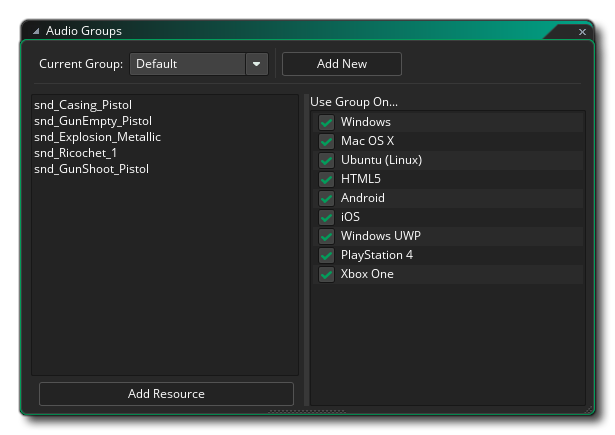
The Audio Group Manager is available from the Tools
Menu in the IDE. Here you can add, delete and rename Audio
Groups, as well as set their platform export options.
GameMaker Studio 2 permits you to assign each of the audio
resources (sound effects and music) to different audio groups to
try and optimise the number of sounds that are being played at any
one time, as well as give you further control over what platforms
they are exported to. To define an audio group you need to click
![]() on the Add New button which will create new group that you
can then name. To change group, click
on the Add New button which will create new group that you
can then name. To change group, click ![]() on the
drop-down menu and select the one you wish to edit.
on the
drop-down menu and select the one you wish to edit.
To add a sound to an audio group, you need to open the Sound Editor for that sound and then
select the group from the option you will find there, or
alternatively you can add resources to an audio group via the right
mouse button ![]() menu in the resource tree. You
can select one or more sound resources (or a resource folder) and
then use the RMB menu to add the sounds to any group.
menu in the resource tree. You
can select one or more sound resources (or a resource folder) and
then use the RMB menu to add the sounds to any group.
Once you have a sound added to a custom audio group then you can use this window to selectively choose which platform to export that sound to. It may be that by default you have all your sounds at the highest quality, but that for HTML5 (for example) you want to use a lower quality sound file set to use less memory. In that case you add the lower quality files to GameMaker Studio 2 and then assign them to a new audio group. You would then select that audio group from the drop down menu and set it to export only to HTML5, and remove the HTML5 export from the higher quality audio group export options. It is important to note that you cannot change the export options for the "default" audio group and that it will always be exported to all available platforms when you build a final game package.
Once you have defined audio groups and assigned sounds to them you can see them in the list on the left when you select the group. There will always be a "default" audio group available and all the sounds that are within this group will always be included in the game package for all platforms and they will all be loaded into memory on start-up (unless flagged as "streamed" in the Sound Editor properties), but when you create a custom audio group, the files that are added to it will not be loaded into memory until you call the function audio_group_load(). In this way you can control what audio is resident in memory at any time. Note too that for all the audio group functions, you will need to supply the audio group ID value. This is simply the name that you have given the audio group.
Audio Groups are also linked to the Configurations settings. When you select a configuration, you can then open the Audio Groups window and select the export targets from the right hand side for that configuration, and then changing configurations will change these output targets. Note that you cannot set sound resources to different groups on a per-configuration basis, only the export target for the given group.